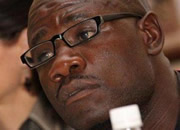Half-Year Review & Projections for July

Reflections on the First Half of the Year The end of June also marks the end of the first half of the year and an assessment of progress has to be made. But a friendly one. For this activity is only a hobby and rakes in no financial benefits. However, whatever thing that is worth doing is worth doing well. That said, lets jump straight to what I set out to do from the beginning of the year and what I have achieved so far. It is good to talk about successes first and failure last. I set out to read 70 books by year-end December 31, 2013 , at an average of almost 6 books a month, repeating what I did in the year 2012. However, when I saw the kind of books I had to read for the Year of Russian Literature (a challenge I had set for myself), I swiftly readjusted it to 60, averaging exactly 5 books per month. So far I have read exactly 30 books and 1 Single Story, which is half of the total books to be read at half of the year. Comparatively, a year ago by this time I had read...










